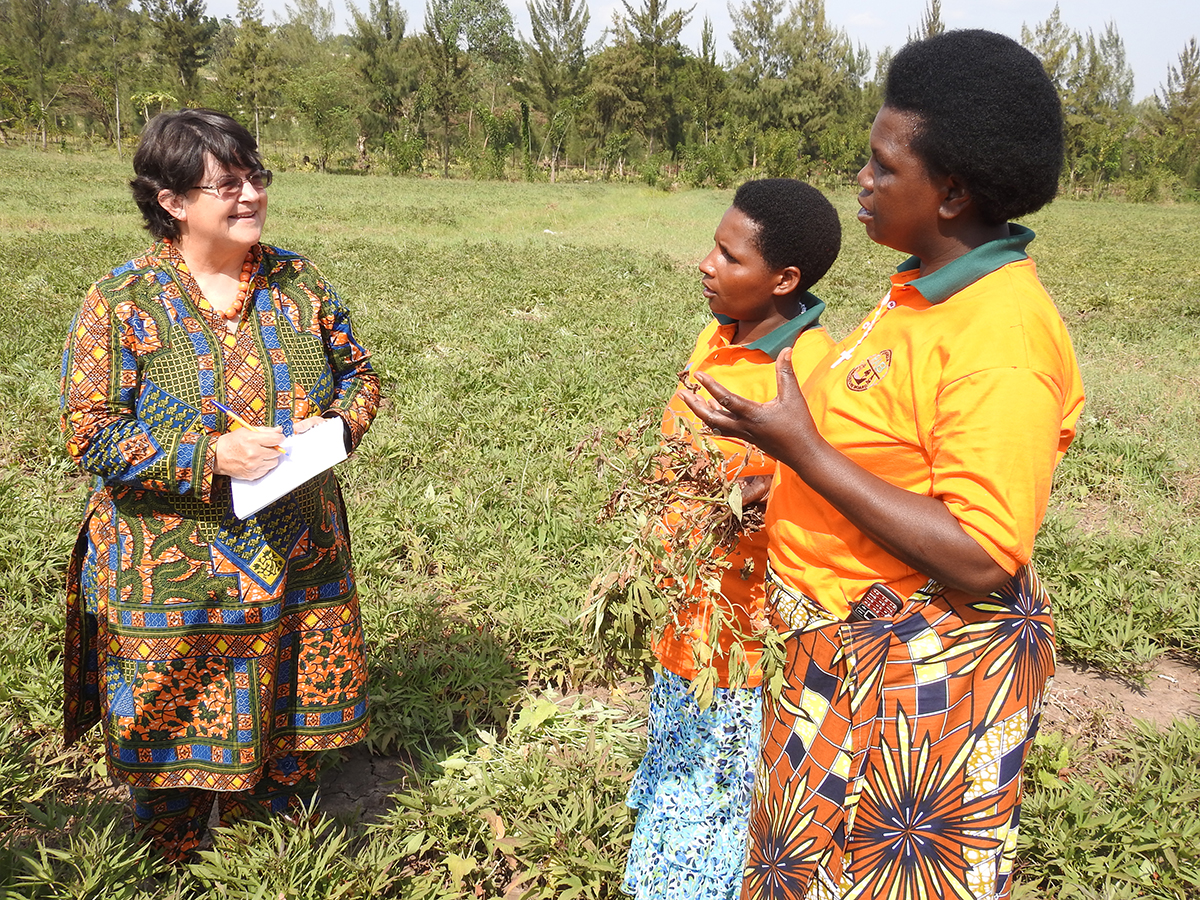Alumna Jan Low named a World Food Prize laureate
By Matt Hayes

Jan Low, M.S. ’85, Ph.D. ’94, an agricultural economist whose pioneering work combining agriculture and nutrition has improved the health of millions in sub-Saharan Africa, has been named a 2016 World Food Prize co-laureate.
The introduction of orange-fleshed sweet potato (OFSP) varieties by Low and two breeders with the International Potato Center (known by its Spanish acronym, CIP) has played a key role in tackling vitamin A deficiency in regions throughout sub-Saharan Africa. Low was recognized for designing and implementing integrated agriculture-nutrition studies that demonstrated impact on vitamin A intakes and status and subsequently led a program that convinced almost 2 million households in 10 African countries to plant, purchase and consume biofortified sweet potatoes.
She shares the $250,000 World Food Prize – given to those who have enhanced human development and confronted hunger by improving the quality, quantity or availability of food – with CIP plant breeders Maria Andrade and Robert Mwanaga, and Howard Bouis of HarvestPlus. The four are being recognized for biofortification – enhancing staple foods with key micronutrients. OFSP is the first biofortified crop to be grown at scale in many sub-Saharan African countries.
The winners will be honored at the Borlaug Dialogue symposium Oct. 12-15 in Des Moines, Iowa.
Sweet potato is a staple crop in much of Africa. In 2003-04, Low conducted the first study that demonstrated the health benefits of consuming the orange-fleshed vegetable, which is rich in beta carotene. Beta carotene is converted into vitamin A in the body. The micronutrient is essential to human health, especially in childhood development, and deficits can lead to blindness and suppress the immune system. Her study showed a 15 percent decline in vitamin A deficiency in children who consumed OFSP regularly compared with children who did not.
Over the past decade Low has spearheaded an integrated approach combining agriculture, nutrition and marketing to introduce OFSP, which is nutritionally superior to the dominant white-fleshed varieties in Africa that have no beta carotene. Previous attempts to introduce OFSP had consistently failed in part because the texture of the more nutrient-dense OFSP couldn’t match the drier consistency preferred by African adults.
Working with plant breeders, Low pushed programs that combined beta carotene traits with locally adapted varieties that are disease-resistant, drought-tolerant and possess the more favored dry-fleshed consistency.
“Breeding takes times, and it takes resources. Convincing people to breed in sub-Saharan Africa was a major challenge,” she said. Her early efforts were stymied by resistance from many organizations to invest in a cross-disciplinary approach spanning agriculture and nutrition.
Low said her education at Cornell prepared her for exactly that kind of approach.
“The great thing about Cornell is that it believes in multidisciplinary work,” she said. Low complemented her economics degrees in the College of Agriculture and Life Sciences with a minor in nutrition. Low credited Daniel Sisler, Ph.D. ’62, the Liberty Hyde Bailey Professor Emeritus of Agricultural Economics, for his mentorship and inspiration to “undertake research that will make a difference in the world.”
It was while doing her postdoctoral research in Kenya in the mid-1990s that Low saw how a nutritional problem like vitamin A deficiency could be addressed through agriculture using OFSP as an entry point.
Sweet potato holds many advantages over other tropical crops. It is an early maturing crop that can be grown at altitudes ranging from sea level to mountain-heights. Low said her background in nutrition helped her conceptualize an approach to combine nutrition education and better agricultural practices to enhance food security.
“It’s a crop that can address hunger and is much easier to grow than many others,” she said. “It can really combat food insecurity and vitamin A deficiency at the same time. If you can enhance the micronutrient content of a staple food and educate communities on how to make better use of the foods they have available, you’re getting a better quality diet, especially for the low-income people who are most vulnerable.”
In 2009 she launched "Sweetpotato for Profit and Health Initiative," a 10-year project to better position biofortified sweet potatoes in 17 African countries, with the goal to reach 10 million households by 2020. This initiative has been supported by the Bill & Melinda Gates Foundation, USAID, UKAID, Irish Aid and many others.
“We along with our partners have reached 2 million households with improved varieties. We are making strides, but we have a long way to go,” she said. “But we have the evidence base and committed partnerships to build on.”
Matt Hayes is managing editor and social media officer for the College of Agriculture and Life Sciences.
Media Contact
Get Cornell news delivered right to your inbox.
Subscribe